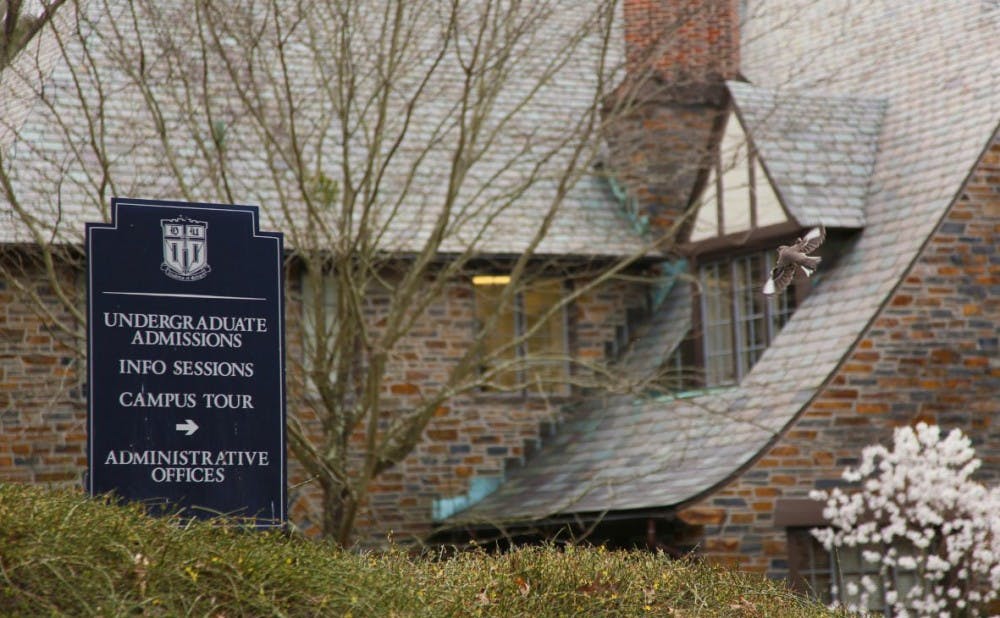This Thursday, Nov. 1, is the early decision deadline for high school seniors applying to join the Duke Class of 2023. According to the Undergraduate Admissions website, applying early decision, or ED, is “suited for students who are sure Duke is their first choice, who have established strong and consistent academic records throughout secondary school and who will have completed all the required standardized testing by early November.” Early decision is also binding—if you get accepted early to Duke, you come to Duke. Last year, with a pool of 4,090 applicants, the ED acceptance rate was 21.4 percent. This was significantly higher than the regular decision acceptance rate of 6.4 percent. While this disparity is often attributed to a higher concentration of quality applicants in the ED pool, I once heard an admissions officer say at an information session, “Are there some people from the regular decision pool who would have gotten in early decision? Yeah, probably.”
I find that statement troubling. Because when you apply early decision here, you are not only committing to Duke as your top choice university—you are committing to attend should you be accepted. In short, in order to apply ED, it seems as though you must be confident that you can pay for Duke, at whatever price they ask of you.
So is ED really for all applicants who are set on Duke and academically qualified? Or are there socioeconomic demographics of applicants that Duke’s ED policy is not serving?
When I was applying to college, the most daunting aspect of the process—other than getting in—was how I would afford my undergraduate education. My parents both work in higher education and have a general understanding of admissions processes. They knew that we qualified for significant financial aid, but we didn’t know just how much assistance we would be given. Even after using the net price calculator on numerous schools’ websites to predict our expected financial contribution, there was something daunting about getting forced into one financial package. What if the prediction the price calculator made wasn’t accurate, and we ended up not being able to pay? What if, after I got accepted ED to a school, that school decided not to give me all the money it had suggested it would? For me, there were too many “what ifs” to go all-in on one school. I decided not to apply early to any university whose early application policy was binding.
I have since learned that if you are accepted ED but your financial package is not feasible for your family, you can renege on your commitment to attend. I think that’s important, but in high school, I didn’t know that was the case—admissions offices do not exactly advertise loopholes in their ED policies. I have also heard the argument that qualified applicants who are willing to commit to Duke as their top choice school should be rewarded for this commitment, and I don’t necessarily object to that: in theory. In practice, though, that type of incentive can hurt those without the financial security or knowledge of college admissions needed to apply ED, even if those applicants are just as passionate as ED applicants about coming to Duke. And disadvantaging those types of students in the admissions process is not something I can get behind.
I am not an admissions officer, and I have no idea if changing our binding early decision policy would have any effect on who gets in here. But I can’t imagine I was the only high school senior who was deterred from applying places under a binding early decision agreement due to concerns about cost. And with Duke’s recent decision to stop covering students’ health insurance, it is hard for me to believe that Duke sees equity as a pressing priority and not just a reluctant obligation.
If the trend continues, earning admission to Duke will be more competitive this year than ever before. Half of the Class of 2023 will come from a few thousand students who apply by this Thursday’s deadline, mentally and financially prepared to commit to being a Blue Devil. But if there is any truth to the notion that some regular decision applicants might have been accepted had they applied early, I would hope that the admissions office can recognize that the decision to apply early is not just a measure of how badly you want to go here.
Ethan Ahuna is a Trinity senior. His column runs on alternate Tuesdays.
Get The Chronicle straight to your inbox
Signup for our weekly newsletter. Cancel at any time.

